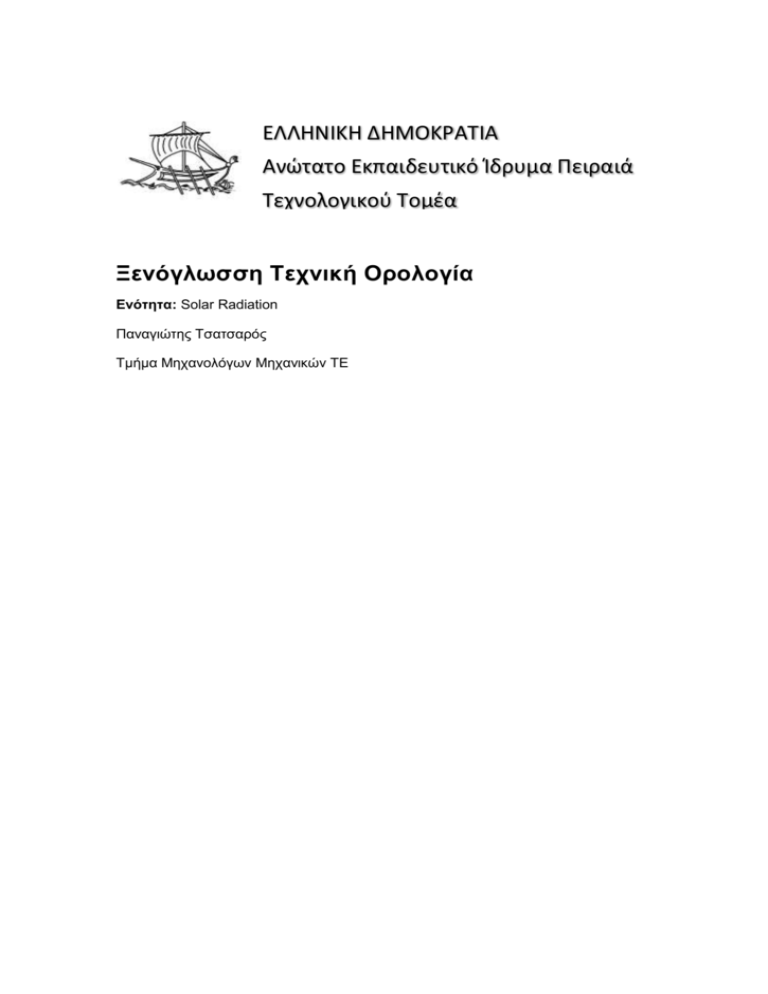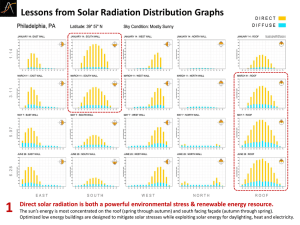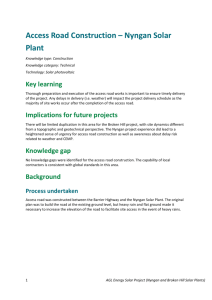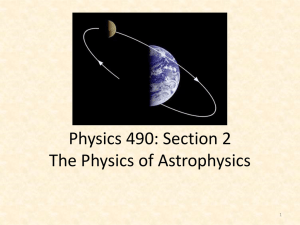Solar Radiation
advertisement

ΕΛΛΗΝΙΚΗ ΔΗΜΟΚΡΑΤΙΑ Ανώτατο Εκπαιδευτικό Ίδρυμα Πειραιά Τεχνολογικού Τομέα Ξενόγλωσση Τεχνική Ορολογία Ενότητα: Solar Radiation Παναγιώτης Τσατσαρός Τμήμα Μηχανολόγων Μηχανικών ΤΕ Άδειες Χρήσης • Το παρόν εκπαιδευτικό υλικό υπόκειται σε άδειες χρήσης Creative Commons. • Για εκπαιδευτικό υλικό, όπως εικόνες, που υπόκειται σε άλλου τύπου άδειας χρήσης, η άδεια χρήσης αναφέρεται ρητώς. Χρηματοδότηση • Το παρόν εκπαιδευτικό υλικό έχει αναπτυχθεί στα πλαίσια του εκπαιδευτικού έργου του διδάσκοντα. • Το έργο «Ανοικτά Ακαδημαϊκά Μαθήματα στο Ανώτατο Εκπαιδευτικό Ίδρυμα Πειραιά Τεχνολογικού Τομέα» έχει χρηματοδοτήσει μόνο την αναδιαμόρφωση του εκπαιδευτικού υλικού. • Το έργο υλοποιείται στο πλαίσιο του Επιχειρησιακού Προγράμματος «Εκπαίδευση και Δια Βίου Μάθηση» και συγχρηματοδοτείται από την Ευρωπαϊκή Ένωση (Ευρωπαϊκό Κοινωνικό Ταμείο) και από εθνικούς πόρους. 2 1. Σκοποί ενότητας ................................................................................................ 4 2. Περιεχόμενα ενότητας........................................................................................ 4 3. Solar Radiation .................................................................................................. 5 4. Practice and Exercise ........................................................................................ 5 4.1 Exercise A:Finding out facts ........................................................................ 5 4.2 Exercise B:Checking facts and ideas .......................................................... 5 4.3 Exercise C: Making deductions ................................................................... 6 4.4 Exercise D: Word meaning in context.......................................................... 6 4.5 Exercise E: Word meaning in context .......................................................... 6 4.6 Exercise F: Filling in information .................................................................. 7 4.7 Exercise G: Preposition practice ................................................................. 7 3 1. Σκοποί ενότητας The aims of this unit are to: Provide authentic text and vocabulary specific to the needs of students of Mechanical Engineering Encourage students to combine their knowledge of English with their technical knowledge Encourage students to find out facts about a topic Teach students how to provide relevant information Encourage students to make deductions Enable students to check facts and ideas 2. Περιεχόμενα ενότητας Contents of the unit Solar radiation and solar thermal systems Variability of solar radiation Calculating irradiance of sunlight 4 3. Solar Radiation The performance of a solar thermal system depends on the solar radiation available to it. Solar radiation is characterized by its variability. Even when abundant it varies during the day, reaching a maximum at noon when the path length through the atmosphere is the shortest. Unless the collector is continuously turned to face the sun. The sun's changing altitude and azimuth will reduce the collected heat bellow the potential maximum. The hours of daylight also seasonally, being the shortest in winter when the need for heat is the greatest. Therefore, unlike most other power production equipment, solar collectors remain dormant for one- third to two- thirds of the day, increasing system cost considerably. The local atmosphere, of course, appreciably affects the available sunlight. Ordinary pollution may reduce it 10% and in problem locations such as the Los Angeles basin there can be a much greater effect. Clouds are also a part of the climate in most localities and the solar efficiency suffers accordingly. In this chapter extra terrestrial radiation will be discussed and methods for calculating irradiance of sunlight will be described for clear clays in the United States and Canada. Then solar radiation measurement will be introduced and methods described to obtain monthly values for total radiation on inclined surfaces from monthly total horizontal radiation. This monthly measurement generally expressed, as the daily average of the total radiation, is the only available solar radiation data for a great many locations. When hourly radiation values are available from measurement or from cloud cover information, these data can be used more accurately for system design than average monthly information if they are preprocessed into detailed tables of radiation and weather data. Preparation of these tables will be discussed and ways outlined to predict similar information for sites for which only monthly data are available. 4. Practice and Exercise 4.1 Exercise A:Finding out facts Answer the questions: 1. What is the main attribute of solar radiation? How does the text characterize solar collectors and why? 2. How is solar radiation related to local atmosphere? 3. Why are hourly radiation values preferred to average monthly information? 4.2 Exercise B:Checking facts and ideas Check if the following statements are True or False. If they are false, justify and give the right answer. 5 1. Sufficient sun availability entails abundance and guaranteed performance of a solar thermal system. ………………………………………………………………………………………... 2. Path length varies thus influencing solar radiation. ………………………………………………………………………………………... 3. Turning the collector so that it continuously faces the sun provides the ultimate solution in collecting the maximum solar radiation. ………………………………………………………………………………………... 4. The need for solar radiation and heat is conversely proportional to the actual sunlight. ………………………………………………………………………………………... 5. Since solar collectors remain dormant for one-third to two-thirds of the day the system cost reduces. ………………………………………………………………………………………... 6. Elaboration of the data offered by hourly radiation values contribute to an accurate system design. ………………………………………………………………………………………... 4.3 Exercise C: Making deductions Finish up the incomplete sentences with information from the text: 1. If solar radiation wasn't characterized by its variability,…………………………. 2. Ordinary pollution is so influential …………………………………………………. 3. The only availability of solar radiation data……………………………………….. 4.4 Exercise D: Word meaning in context Find words from the text that have the same meaning as the following: 1. affluent, bountiful:……………................................. 2. route, drive:…………………………………………... 3. possible, probable:………………………………….. 4. hibernated, asleep:…………………………………. 5. notably, significantly:……………………………….. 6. that can be valued:…………………………………. 7. Correspondingly:……………………………………. 8. Acquire:……………………………………………… 9. leaning:………………………………………………. 10. precisely:…………………………………………….. 11. describe roughly:……………………………………. 4.5 Exercise E: Word meaning in context Give the opposites for the following words: 1. variability: 2. continuously: 6 3. increasing: 4. ordinary: 5. generally: 4.6 Exercise F: Filling in information Complete the following text with the words given, using the right forms for the verbs: utilization; require, compare, tidal, alternative, resources, add, options, renewable, relative. It is useful to………………….(1) the various …………………. (2) energy sources in terms of the amount of energy available for…………………. (3) and by the degree of sophistication in technology…………………. (4) for their exploitation. In terms of the amount available, the solar energy and nuclear energy…………………. (5) are very large…………………. (6), with the solar option having the…………………. (7) advantage of being…………………. (8). The energy available from oil shale is also quite large…………………. (9) to these sources, the energy available from tar-sands, …………………. (10) and wave energy and geothermal energy is very small. [...] Adopted from Solar Energy, by S. P. Sukhtme 4.7 Exercise G: Preposition practice Complete the rest of the text above with the prepositions missing: [...] In terms…………………. (1 ) the sophistication needed, both the possibilities…………………. (2) the nuclear energy option, namely the breeder reactor and nuclear fusion, call …………………. (3) a very light degree of technological sophistication contrast(4), the technologies involved…………………. (5) the exploitation of tar-sands, oil shale, tidal energy and thermal energy arc simpler. The solar energy option is somewhat difficult to classify. Some solar technologies are quite involved. These include the development of photovoltaic cells and applications like the generation of power in space and…………………. (6) earth using the central tower concept…………………. (7)the other hand, many solar technologies like water heading, air heating and drying of products, are simple and can be readily adopted. 7





